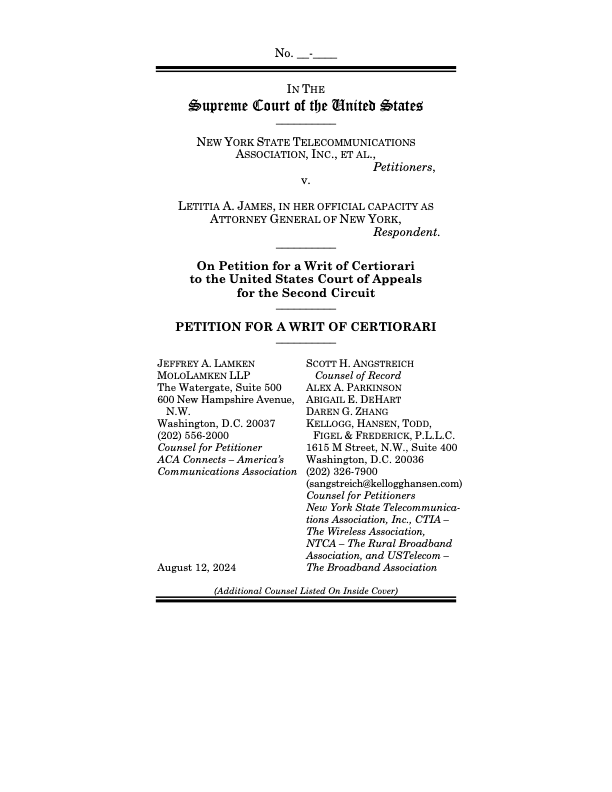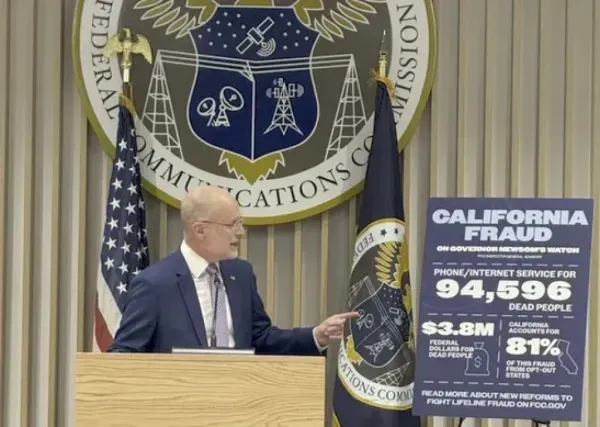ISPs Ask Supreme Court to Find N.Y. Law Illegal – After Net Neutrality is Sorted Out
Broadband providers say Title I of the Communications Act preempts state rate regulation.
Jake Neenan

WASHINGTON, Aug 13, 2024 – Internet Service Providers want the Supreme Court to shelve a New York law that would regulate their rates. But because many of these ISPs have also challenged the Federal Communications Commission's Net Neutrality rules, the litigation strategy has gotten a bit complicated.

Petition for a Writ of Certiorari
As expected, broadband providers want the Supreme Court to reverse a Second Circuit ruling that upheld the New York law, which capped prices for low-income broadband subscribers. But ISPs want the high court to hold off on taking up the question until a separate challenge to net neutrality has been settled.
The analysis the Second Circuit relied on, and which the broadband industry is challenging, relied on broadband being a Title I service under the Communications Act. That decision was released one day after the FCC voted to reinstate net neutrality and make broadband a Title II service subject to more expansive FCC oversight. ISPs challenged that order and successfully convinced the Sixth Circuit to put it on pause, keeping Title I in place as the regulatory regime for broadband.
“This Court should grant the petition and reverse the Second Circuit’s judgment, ensuring that broadband remains subject to uniform, national regulation,” broadband industry groups wrote in a Monday petition to the Supreme Court. “Given the interrelationship between this case and the Sixth Circuit’s review of the FCC’s recent order, however, the most orderly approach would be for this Court to do so after the Sixth Circuit or (if someone seeks and this Court grants certiorari) this Court first confirms the Title I classification of broadband.”
There is some overlap between the challengers to the New York law and to the net neutrality rules: USTelecom, which represents major broadband providers; CTIA, which represents wireless providers; and ACA Connects, which represents smaller ISPs.
New York Attorney General Letitia James agreed not to enforce the law, which requires prices of $20 per month or less for low-income subscribers, while the Supreme Court considers the ISP petition. The providers still asked for a stay, because James’s office intends to enforce the law after the court reaches a decision. Justice Sonia Sotomayor asked the New York AG for a response to that stay petition by September 16.
The industry groups argued in their petition that by not granting the FCC authority to regulate rates, Title I of the Communications Act overruled any state authority to do the same. The Second Circuit had found that lack of authority opened the door for states to regulate prices for Title I services as they saw fit.
“Congress’s exclusion of interstate information services from public-utility regulation means that such rate regulation is ruled out — not that States are free to do it in the Commission’s stead,” the ISPs wrote.
Analysts at New Street Research have said it’s not clear that the New York law would be struck down if net neutrality did survive the current legal challenge, despite imposing the Title II framework.
The Biden administration and Democratic lawmakers tend to look favorably on strong measures to ensure affordability, and the commission said in its order that “the mere existence of a state affordability program is not rate regulation.”









Member discussion